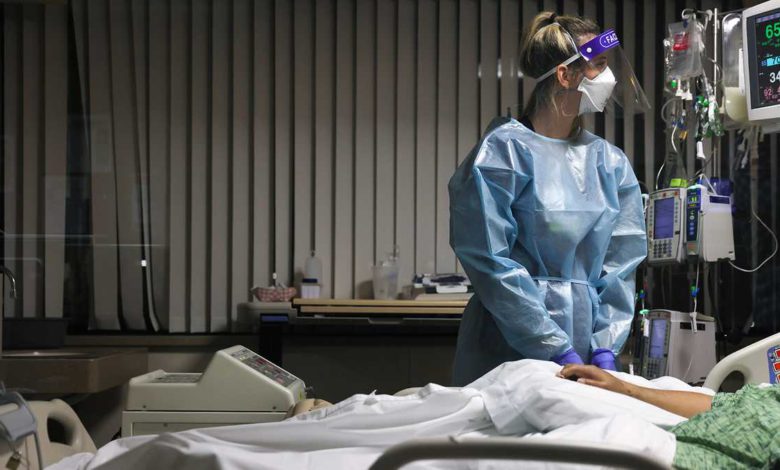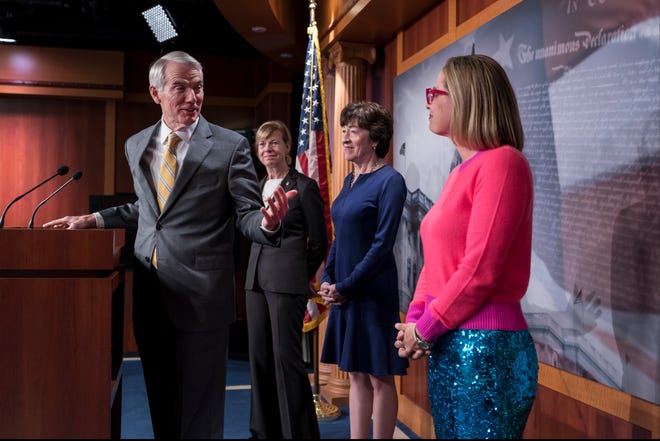

The U.S. has surpassed 20,000 new COVID-19 cases for the fourth day in a row as the highly contagious delta variant persists in its track in being the most common form of the coronavirus in the country.The last time the country had back-to-back days of cases topping 20,000 was in May, according to the data.Dr. Rochelle Walensky, who heads the Centers for Disease Control and Prevention, said Thursday that more than 9 million people live in counties where cases are rising and where the vaccination rates are lower than 40%."Many of these counties are also the same locations where the delta variant represents the large majority of circulating virus," she said.Dr. Anthony Fauci, director of the National Institute of Infectious Diseases, said the variant could bring about mini-surges in infections in those areas."I'm concerned as this variant becomes more dominant, those select areas of the country that have a very low level of vaccination, like 30% or so, you're going to start seeing mini-surges that are localized to certain regions," he said Friday."You don't want to see two separate Americas, one that's vaccinated and protected and yet another that's unvaccinated and very much at risk," Fauci said.Overall, 47.8% of the U.S. population is fully vaccinated while 20 states have fully vaccinated more than half of their residents.Sounding the alarm in MississippiThe surge has alarmed officials in Mississippi, where only a third of the population is fully vaccinated."We've seen almost an entire takeover in thedDelta variant," said State Health Officer Dr. Thomas Dobbs."We're seeing a lot of outbreaks. We're seeing a lot of outbreaks in youth. We're seeing a lot of outbreaks in summer activities. We're also seeing a lot of outbreaks in nursing homes, where we have our most vulnerable people," he said.Case numbers and hospitalizations are trending upward because of the spread of the virus mostly among those who are unvaccinated, State Epidemiologist Dr. Paul Byers said.While the number of deaths hasn't risen, Byers said they anticipate that to change because death numbers tend to lag behind case numbers.The state is advising seniors aged 65 and older to avoid mass gatherings until July 26, regardless of vaccination status.People who are immunocompromised — whose immune system is weaker — are also recommended to follow the new guidance issued Friday.Advice for those with upper respiratory symptomsAs cases rise, the CDC is urging all adults and children who exhibit upper respiratory symptoms to be tested for COVID-19, regardless of their vaccination status, Walensky told CNN on Friday.While there is considerable overlap between symptoms of the common cold and COVID-19 as they are both respiratory diseases, not everyone will experience the same symptoms for either illness — and some people might not experience any symptoms at all.However, she said that people who are fully vaccinated should continue to feel very protected against serious illness.A breakthrough infection should be thought of as "vaccine success" as opposed to vaccine failure, Walensky said, because the vaccine is doing what it was developed to do: prevent severe disease and death.Breakthrough infections occur when fully vaccinated people contract the virus.Early studies have also confirmed that most people who develop breakthrough infections do not replicate enough virus in their bodies to become contagious, she said. Even though people might test positive, they are not likely a source of the spread of the virus.Will a booster be needed in the future?After Pfizer announced Thursday that it's working to develop a third vaccine booster shot, questions emerged about the long-term effectiveness of vaccines.In response, Fauci said people should take booster advice from federal health officials."Certainly, they need to listen to the CDC and the FDA, the FDA being the regulatory authority that has control over this. And the CDC, in accordance with their advisory committee on immunization practices, will make the recommendation," he said."We respect what the pharmaceutical company is doing, but the American public should take their advice from the CDC and the FDA," he said.Dr. Peter Hotez, chair of tropical pediatrics at Texas Children's Hospital, said the current vaccines offer high protection."It looks like the two doses of the current vaccine are pretty robust against the Delta variant," Hotez said Friday. "So yes, we'll need a booster, but nothing to worry about right now in terms of vaccination."Pfizer said it was seeing waning immunity from its vaccine — manufactured in partnership with BioNTech — and was picking up its efforts to develop a booster shot to offer further protection against variants.Dr. Stephen Thomas, coordinating principal investigator for Pfizer/BioNTech's vaccine trial, said it wasn't unusual for vaccine-induced immunity to wane over time."What is the crucial point though, and which we don't know the answer to right now is, even though that immunity wanes over time, does it remain above a level which we need to protect people," he told CNN's Erin Burnett."I would kind of focus people on the point here, that the public health burden of Covid is severe disease, hospitalization and death," he said. "Even though these vaccine immune responses wane over time, they are very, very effective at preventing those three outcomes."Federal guidance on school in fall encourages in-person learningMeanwhile, the CDC on Friday said schools should prioritize in-person schooling in the fall but it was crucial to layer safety strategies such as masking and physical distancing, and most importantly, vaccinations for everyone eligible.Schools that are ready to transition away from pandemic precautions as community transmission reaches low levels should do so gradually, the agency said in a draft of the guidance obtained by CNN."If localities decide to remove prevention strategies in schools based on local conditions, they should remove them one at a time and monitor closely (with adequate testing) for any increases in COVID-19 cases before removing the next prevention strategy," the guidance says, adding that schools need to be transparent with families, staff and the community as they do so.Fauci agrees, adding that unvaccinated children should wear masks."I think that the message from the CDC is clear and I totally agree with them," Fauci told CNN. "We want all the children back in in-person classes in the fall term."
The U.S. has surpassed 20,000 new COVID-19 cases for the fourth day in a row as the highly contagious delta variant persists in its track in being the most common form of the coronavirus in the country.
The last time the country had back-to-back days of cases topping 20,000 was in May, according to the data.
Dr. Rochelle Walensky, who heads the Centers for Disease Control and Prevention, said Thursday that more than 9 million people live in counties where cases are rising and where the vaccination rates are lower than 40%.
"Many of these counties are also the same locations where the delta variant represents the large majority of circulating virus," she said.
Dr. Anthony Fauci, director of the National Institute of Infectious Diseases, said the variant could bring about mini-surges in infections in those areas.
"I'm concerned as this variant becomes more dominant, those select areas of the country that have a very low level of vaccination, like 30% or so, you're going to start seeing mini-surges that are localized to certain regions," he said Friday.
"You don't want to see two separate Americas, one that's vaccinated and protected and yet another that's unvaccinated and very much at risk," Fauci said.
Overall, 47.8% of the U.S. population is fully vaccinated while 20 states have fully vaccinated more than half of their residents.
Sounding the alarm in Mississippi
The surge has alarmed officials in Mississippi, where only a third of the population is fully vaccinated.
"We've seen almost an entire takeover in thedDelta variant," said State Health Officer Dr. Thomas Dobbs.
"We're seeing a lot of outbreaks. We're seeing a lot of outbreaks in youth. We're seeing a lot of outbreaks in summer activities. We're also seeing a lot of outbreaks in nursing homes, where we have our most vulnerable people," he said.
Case numbers and hospitalizations are trending upward because of the spread of the virus mostly among those who are unvaccinated, State Epidemiologist Dr. Paul Byers said.
While the number of deaths hasn't risen, Byers said they anticipate that to change because death numbers tend to lag behind case numbers.
The state is advising seniors aged 65 and older to avoid mass gatherings until July 26, regardless of vaccination status.
People who are immunocompromised — whose immune system is weaker — are also recommended to follow the new guidance issued Friday.
Advice for those with upper respiratory symptoms
As cases rise, the CDC is urging all adults and children who exhibit upper respiratory symptoms to be tested for COVID-19, regardless of their vaccination status, Walensky told CNN on Friday.
While there is considerable overlap between symptoms of the common cold and COVID-19 as they are both respiratory diseases, not everyone will experience the same symptoms for either illness — and some people might not experience any symptoms at all.
However, she said that people who are fully vaccinated should continue to feel very protected against serious illness.
A breakthrough infection should be thought of as "vaccine success" as opposed to vaccine failure, Walensky said, because the vaccine is doing what it was developed to do: prevent severe disease and death.
Breakthrough infections occur when fully vaccinated people contract the virus.
Early studies have also confirmed that most people who develop breakthrough infections do not replicate enough virus in their bodies to become contagious, she said. Even though people might test positive, they are not likely a source of the spread of the virus.
Will a booster be needed in the future?
After Pfizer announced Thursday that it's working to develop a third vaccine booster shot, questions emerged about the long-term effectiveness of vaccines.
In response, Fauci said people should take booster advice from federal health officials.
"Certainly, they need to listen to the CDC and the FDA, the FDA being the regulatory authority that has control over this. And the CDC, in accordance with their advisory committee on immunization practices, will make the recommendation," he said.
"We respect what the pharmaceutical company is doing, but the American public should take their advice from the CDC and the FDA," he said.
Dr. Peter Hotez, chair of tropical pediatrics at Texas Children's Hospital, said the current vaccines offer high protection.
"It looks like the two doses of the current vaccine are pretty robust against the Delta variant," Hotez said Friday. "So yes, we'll need a booster, but nothing to worry about right now in terms of vaccination."
Pfizer said it was seeing waning immunity from its vaccine — manufactured in partnership with BioNTech — and was picking up its efforts to develop a booster shot to offer further protection against variants.
Dr. Stephen Thomas, coordinating principal investigator for Pfizer/BioNTech's vaccine trial, said it wasn't unusual for vaccine-induced immunity to wane over time.
"What is the crucial point though, and which we don't know the answer to right now is, even though that immunity wanes over time, does it remain above a level which we need to protect people," he told CNN's Erin Burnett.
"I would kind of focus people on the point here, that the public health burden of Covid is severe disease, hospitalization and death," he said. "Even though these vaccine immune responses wane over time, they are very, very effective at preventing those three outcomes."
Federal guidance on school in fall encourages in-person learning
Meanwhile, the CDC on Friday said schools should prioritize in-person schooling in the fall but it was crucial to layer safety strategies such as masking and physical distancing, and most importantly, vaccinations for everyone eligible.
Schools that are ready to transition away from pandemic precautions as community transmission reaches low levels should do so gradually, the agency said in a draft of the guidance obtained by CNN.
"If localities decide to remove prevention strategies in schools based on local conditions, they should remove them one at a time and monitor closely (with adequate testing) for any increases in COVID-19 cases before removing the next prevention strategy," the guidance says, adding that schools need to be transparent with families, staff and the community as they do so.
Fauci agrees, adding that unvaccinated children should wear masks.
"I think that the message from the CDC is clear and I totally agree with them," Fauci told CNN. "We want all the children back in in-person classes in the fall term."








